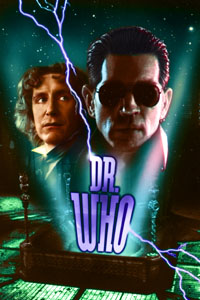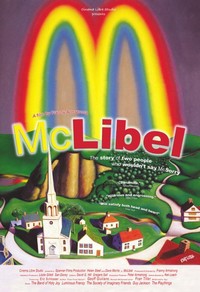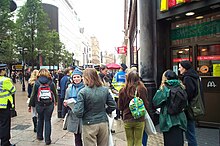McDonald's Corporation v Steel & Morris [1997] EWHC QB 366, known as "the McLibel case", was an English lawsuit for libel filed by McDonald's Corporation against environmental activists Helen Steel and David Morris over a factsheet critical of the company. Each of two hearings in English courts found some of the leaflet's contested claims to be libellous and others to be true.

M*A*S*H is an American war comedy-drama television series that aired on CBS from September 17, 1972 to February 28, 1983. It was developed by Larry Gelbart as the first original spin-off series adapted from the 1970 feature film M*A*S*H, which, in turn, was based on Richard Hooker's 1968 novel MASH: A Novel About Three Army Doctors. The series, which was produced with 20th Century Fox Television for CBS, follows a team of doctors and support staff stationed at the "4077th Mobile Army Surgical Hospital" in Uijeongbu, South Korea, during the Korean War (1950–53).

Doctor Who, also referred to as Doctor Who: The Television Movie or simply Doctor Who: The Movie to distinguish it from the television series of the same title, is a 1996 television film continuing the British science fiction television series Doctor Who. It was developed as a co-production between Universal Studios and BBC Worldwide. It premiered on 12 May 1996 on CITV in Edmonton, Alberta, Canada, 15 days before its first showing in the United Kingdom on BBC One and two days before being broadcast in the United States on Fox. It was also shown in some countries for a limited time in cinemas.
Desperate Housewives is an American comedy-drama soap opera television series created by Marc Cherry and produced by ABC Studios and Cherry Productions. It aired for eight seasons on ABC from October 3, 2004, until May 13, 2012, for a total of 180 episodes. Executive producer Marc Cherry served as showrunner. Other executive producers since the fourth season included Bob Daily, George W. Perkins, John Pardee, Joey Murphy, David Grossman, and Larry Shaw.

The Wednesday Play is an anthology series of British television plays which ran on BBC1 for six seasons from October 1964 to May 1970. The plays were usually original works written for television, although dramatic adaptations of fiction also featured. The series gained a reputation for presenting contemporary social dramas, and for bringing issues to the attention of a mass audience that would not otherwise have been discussed on screen.

Cathy Come Home is a 1966 BBC television play about homelessness. It was written by Jeremy Sandford, produced by Tony Garnett and directed by Ken Loach. A 1998 Radio Times readers' poll voted it the "best single television drama" and a 2000 industry poll rated it as the second-best British television programme ever made. Filmed in a gritty, realistic drama documentary style, it was first broadcast on 16 November 1966 on BBC1. The play was shown in the BBC's The Wednesday Play anthology strand, which often tackled social issues.

Spanner Films is a small London-based documentary company founded by film director Franny Armstrong in 1997.

Rome is a historical drama television series created by John Milius, William J. MacDonald, and Bruno Heller. The series is set in the 1st century BC, during Ancient Rome's transition from Republic to Empire. The series features a sprawling cast of characters, many based on real figures from historical records, but the lead protagonists are ultimately two soldiers named Lucius Vorenus and Titus Pullo, who find their lives intertwined with key historical events.

Walking with Monsters – Life Before Dinosaurs, marketed as Before the Dinosaurs – Walking with Monsters in North America, is a 2005 three-part nature documentary television miniseries created by Impossible Pictures and produced by the BBC Natural History Unit, the Discovery Channel, ProSieben and France 3. Walking with Monsters explores life in the Paleozoic era, showcasing the early development of groups such as arthropods, fish, amphibians, reptiles and synapsids. Like its predecessors Walking with Dinosaurs (1999) and Walking with Beasts (2001), Walking with Monsters is narrated by Kenneth Branagh.

Planet Earth is a 2006 British television series produced by the BBC Natural History Unit. Five years in the making, it was the most expensive nature documentary series ever commissioned by the BBC and also the first to be filmed in high definition. The series received multiple awards, including four Emmy Awards, a Peabody Award, and an award from the Royal Television Society.

Wendy Wu: Homecoming Warrior is a 2006 Disney Channel Original Movie (DCOM) starring Brenda Song and Shin Koyamada. The voice of Hadley Hudson is also featured. Koyamada plays a Chinese monk who visits the title character. Wendy is an American teenager played by Song, claimed to be the reincarnation of a powerful female warrior. She is also the only person who can prevent a spirit of an ancient and evil Chinese dragon named Yan-Lo, voiced by Hudson, from destroying the world.

Would I Lie to You? is a British comedy game show aired on BBC One, made by Zeppotron for the BBC. It was first broadcast on 16 June 2007, starring David Mitchell and Lee Mack as team captains. The show was originally presented by Angus Deayton, and since 2009 has been hosted by Rob Brydon.

Franny Armstrong is a British documentary film director working for her own company, Spanner Films, and a former drummer with indie pop group The Band of Holy Joy. She is best known for three films: The Age of Stupid, a reflection from 2055 about climate change, McLibel, about the McDonald's court case and Drowned Out, following the fight against the Narmada Dam Project.

The first series of the 2005 revival of the British science fiction programme Doctor Who began on 26 March 2005 with the episode "Rose". This marked the end of the programme's 16-year absence from episodic television following its cancellation in 1989, and was the first new televised Doctor Who story since the broadcast of the television movie starring Paul McGann in 1996. The finale episode, "The Parting of the Ways", was broadcast on 18 June 2005. The show was revived by longtime Doctor Who fan Russell T Davies, who had been lobbying the BBC since the late 1990s to bring the show back. The first series comprised 13 episodes, eight of which Davies wrote. Davies, Julie Gardner and Mal Young served as executive producers, Phil Collinson as producer.

Charles Darwin and the Tree of Life is a 2009 television documentary about Charles Darwin and his revolutionary theory of evolution through natural selection, produced by the BBC to mark the bicentenary of Darwin's birth. It is part of the BBC Darwin Season. The presenter, David Attenborough, outlines the development of the theory by Darwin through his observations of animals and plants in nature and in the domesticated state, visiting sites important in Darwin's own life, including Down House, Cambridge University and the Natural History Museum, and using archive footage from Attenborough's many nature documentaries for the BBC. He reviews the development of the theory since its beginnings, and its revolutionary impact on the way in which humans view themselves – not as having dominion over the animals as The Bible says, but as part of the natural world and subject to the same controlling forces that govern all life on Earth.

The eighth season of Family Guy first aired on the Fox network in twenty-one episodes from September 27, 2009, to May 23, 2010, before being released as two DVD box sets and in syndication. It ran on Sunday nights between May and July 2010 on BBC Three in the UK. The animated television series Family Guy follows the dysfunctional Griffin family—father Peter, mother Lois, daughter Meg, son Chris, baby Stewie and dog Brian, all of whom reside in their hometown of Quahog.
Adam Wishart is a documentary filmmaker. His professional background includes writing, directing, and appearing in various productions for BBC television projects.

Inside Claridge's is a British documentary television series that first broadcast on BBC Two on 3 December 2012. The final episode aired on 17 December 2012. The series documented a year behind the scenes of Claridge's, a five-star hotel located in Mayfair, London.

The Big Flame is a 1969 BBC television play by socialist playwright Jim Allen, produced by Tony Garnett and directed by Ken Loach. The play tells the story of 10,000 dockworkers occupying the Liverpool docks in a "work-in". Filmed in a gritty, realistic drama documentary style, it was first broadcast on 19 February 1969 on BBC1, at a time when unemployment was rising in Britain. The play was shown in the BBC's The Wednesday Play anthology strand, which was noted for tackling social issues.

Kenneth Charles Loach is a British film director and screenwriter. His socially critical directing style and socialist ideals are evident in his film treatment of social issues such as poverty, homelessness, and labour rights.

















